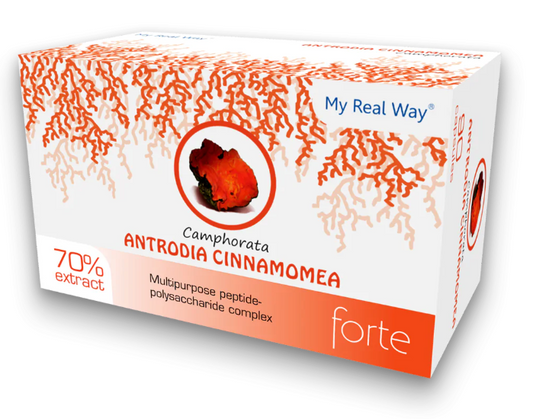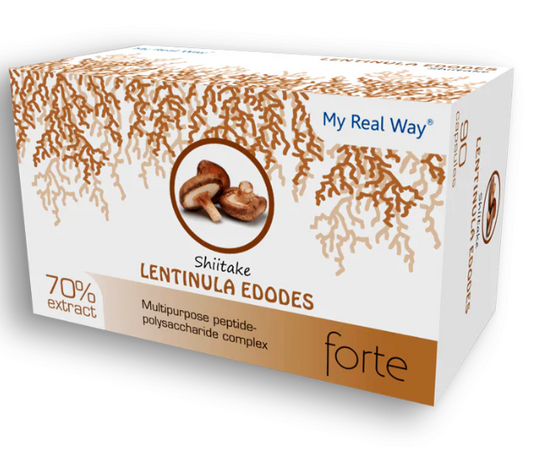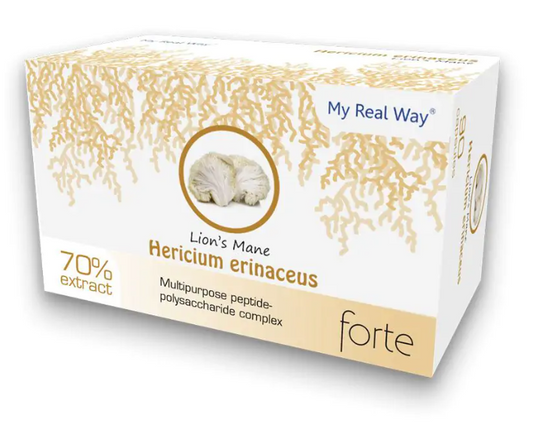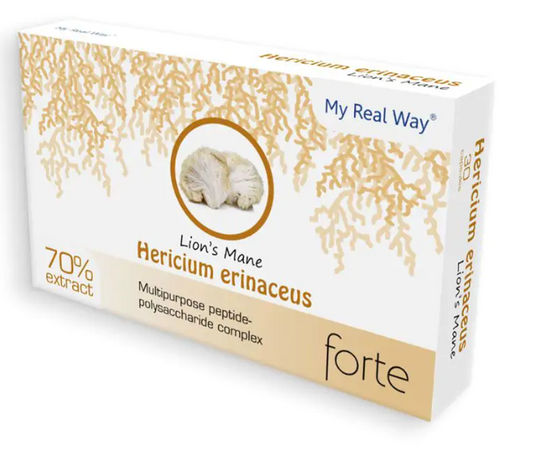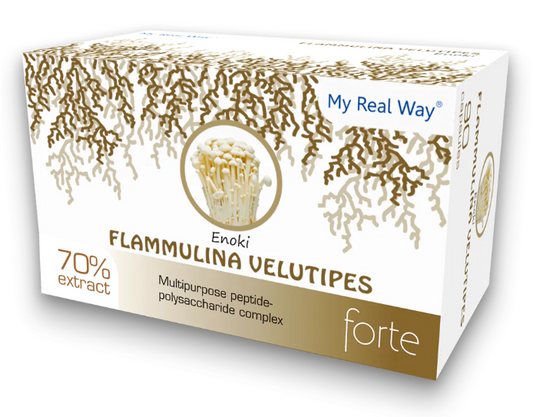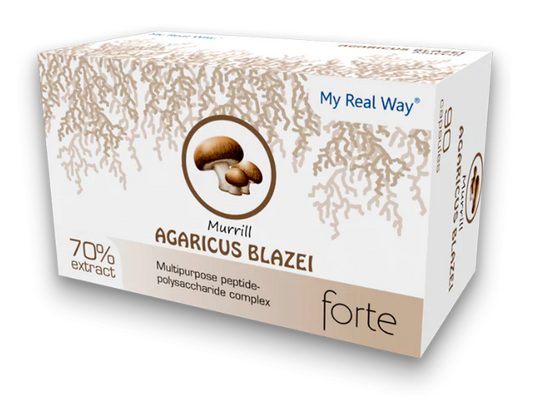
Mokslinės publikacijos apie grybų poveikį žmogaus organizmui
Medicinal mushrooms and their benefits: what the science says.
Why are medicinal mushrooms getting so much attention?
In recent years, there has been increasing attention paid to natural food supplements that can support health. Among such remedies are medicinal mushrooms , which have been used in traditional medicine for centuries, and whose effects are now being increasingly studied in modern scientific practice.
Mushrooms contain many biologically active compounds:
- β-glucans strengthen the immune system by activating macrophages, NK cells, and T cells.
- Polysaccharides have antioxidant and anti-inflammatory properties.
- Triterpenes – studies show they have anticarcinogenic and liver-protective effects.
- Ergosterol is a provitamin D2, which is beneficial for bone health.
Next, we will discuss the five most frequently mentioned mushrooms in scientific research: Agaricus Blazei Murrill, Lentinula edodes (Shiitake), Flammulina velutipes (Enoki), Antrodia Camphorata, and Hericium erinaceus (Lion's Mane Mushroom).
Main scientifically researched mushrooms
Agaricus Blazei Murrill – immune system booster
Agaricus Blazei Murrill, also known as "Royal Agaricus," originated in Brazil but is widely used in Asia.
🔹 Immune response:
Studies have shown that Agaricus polysaccharides activate macrophages, dendritic cells, and NK cells, thereby strengthening the body's defense system (Hetland et al., Scand J Immunol , 2008, PubMed 18549452) . ).
🔹 Assistance in oncology:
In cancer patients, Agaricus supplements improved quality of life and reduced chemotherapy-induced symptoms such as fatigue and loss of appetite (Ahn et al., World J Gastroenterol , 2004, PubMed 15484383). ).
🔹 Antioxidant effect:
In vitro studies show strong free radical scavenging, protecting against oxidative stress.
Lentinula edodes (Shiitake) – strengthening the immune system
Shiitake is one of the most popular edible and medicinal mushrooms in the world.
🔹 Clinical trial with healthy individuals:
When consuming 5–10 g of dried shiitake daily for 4 weeks:
- NK-T cell activity increased by a factor of 2.
- γδ-T cell proliferation increased by ~60%.
- sIgA levels increased – an important indicator of immunity in the gut.
- CRP decreased, indicating an anti-inflammatory effect ( Journal of the American College of Nutrition , 2015, PubMed 25665104) . ).
🔹 Chemotherapy support:
In patients with gastrointestinal cancers, shiitake mycelium extract (LEM) reduced chemotherapy-induced side effects and increased IFN-γ production (Okuno et al., Cancer Immunol Immunother , 2011, PubMed 21221748). ).
🔹 Antioxidant properties:
Polysaccharides from shiitake mushrooms exhibit strong hydroxyl radical scavenging activity, which allows them to be considered as potential antioxidants (Chen et al., Front Pharmacol , 2020, PMCID: PMC7733652) . ).
Flammulina velutipes (Enoki) – for skin, lipids, and oral health.
Enoki – traditionally consumed in Asia, known for its long, white stems.
🔹 Skin moisture (clinical study):
In a study of two groups of blind individuals (30 women, aged 20–59), consuming 3 g of enoki powder daily for 4 weeks improved skin moisture (p = 0.033) ( Nutrients , 2020, MDPI). ).
🔹 Cholesterol reduction:
In animal studies, 1–3% enoki extract reduced total cholesterol, TG, and LDL, and improved the LDL/HDL ratio ( J Nutr Sci Vitaminol , 2013, PubMed 23883631). ).
🔹 Antibacterial effect (for oral health):
Ethanol extract inhibited the growth of Streptococcus mutans and biofilm formation, and no toxic effects on oral mucosal cells were observed ( Arch Oral Biol , 2016, PubMed 27080718). ).
🔹 Weight management (Chitoglucan):
In a 12-week study with overweight patients, enoki extract reduced body weight, visceral fat, and BMI ( Human Clinicals , 2015, Link) . ).
Antrodia Camphorata – for the heart and liver
This mushroom is widely used in Taiwan and is known for its strong biological activity.
🔹Anticancer properties (in vitro):
The extract inhibited cancer cell proliferation, induced apoptosis, and modulated the Wnt/β-catenin pathway ( Cancer Lett , 2011, Wiley). ).
🔹 Liver protection (experiments):
In animal studies, it reduced ALT, AST, and inflammatory markers in cases of alcohol-induced liver damage ( Molecules , 2017, MDPI). ).
🔹 Neuroprotection:
In vitro studies have shown that A. camphorata can protect neurons from the toxic effects of β-amyloid in an Alzheimer's disease model ( Neurochem Int , 2014, PubMed 24389270). ).
Hericium erinaceus (Lion's Mane Mushroom) – for the brain and nervous system
Hericium is one of the most studied mushrooms due to its effects on the brain.
🔹 Cognitive functions:
- A 12-week study with older adults showed improved MMSE test results, indicating support for cognitive function ( Phytother Res , 2009, PubMed 18844328).).
- Young adults showed improved Stroop test results and reduced stress after 28 days of consumption ( Nutrients , 2020, MDPI) . ).
🔹 Mood and emotional state:
An 8-week study of overweight patients observed a reduction in anxiety, depression, and sleep disturbances ( Biomed Pharmacother , 2020, Wiley).).
🔹 Neurotrophic factors:
Hericium consumption increased BDNF and NGF levels, which promote neuronal growth and protection ( Front Aging Neurosci , 2024, ScienceDirect).).
🔹 Security:
Toxicological studies have shown that Hericium is safe – the NOAEL for β-glucan is 2000 mg/kg per day, and no genotoxicity was observed ( Food Chem Toxicol , 2019, PubMed 30716539).).
How to safely consume medicinal mushrooms?
- Dosage: Doses of 1–3 g of mushroom extracts per day have been used in many clinical studies.
- Safety: Moderate doses are considered safe, but high doses (e.g., >6 g/kg enoki) may cause side effects.
- Interactions: When used in conjunction with other medications (especially chemotherapeutic agents), consultation with a physician is necessary.
Conclusions
Scientific research confirms that medicinal mushrooms can help strengthen the immune system, improve cardiovascular and nervous system function, and support skin and gut health.
- Shiitake and Agaricus – for the immune system.
- Enoki – for skin, cholesterol, and weight control.
- Antrodia – for heart and liver health.
- Hericium – for cognitive function and emotional balance.
They are not medicines, but they can be useful as nutritional supplements for general body strengthening and prevention .
Polysaccharide Peptides (Medicinal Mushrooms)
-
Antrodia Camphorata mushroom extract 70%, 90 caps.
Regular price €70,00 EURRegular price -
Shiitake mushroom extract (Lentinula edodes Shiitake) 70%, 90 caps
Regular price €70,00 EURRegular price -
Lion's Mane Mushroom Extract (Hericium erinaceus) 70%|My Real Way
Regular price €70,00 EURRegular price -
Lion's Mane Mushroom Extract (Hericium erinaceus) 70%, 30 capsules.
Regular price €35,00 EURRegular price -
Enoki mushroom extract (Flammulina velutipes) 70%, 90 caps.
Regular price €70,00 EURRegular price -
Agaricus mushroom extract (Agaricus Blazei Murrill) 70%, 90 capsules.
Regular price €70,00 EURRegular price

